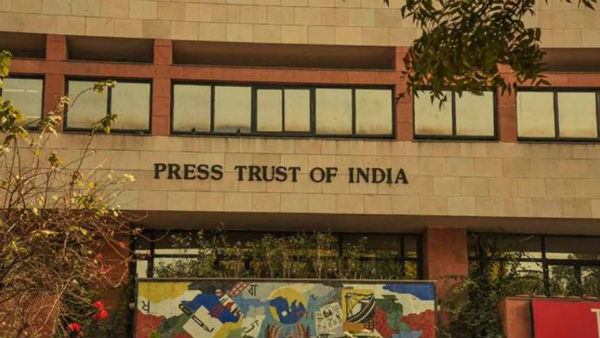The government is coming down heavy on news agency Press Trust of India (PTI) as the Union Ministry of Housing & Urban Affairs has now sent a notice to PTI asking them to pay dues worth Rs.84.48 crore for violating terms of the lease under which it was allotted land for its Sansad Marg office in Delhi.
The news agency has been asked to clear the dues within a month, failing to which 10% per annum interest will be applied on the pending amount. According to housing ministry officials, the PTI office is built on land leased to the agency by the government.
The officials also iterated that the Press Trust of India had not paid ground rent since 1984 while flouting the lease rules by converting the basement into an office. Under the lease term, the basement is to be used only for storage purposes
Land & Development Office of @MoHUA_India issues demand notice to @PTI_News for temporary regularisation of 'breaches'.
•July 7 notice asks PTI to pay Rs 84.48 Cr penalty in 30 days to regularise violations of by-laws at its Parliament Street, New Delhi based HQ building.
(1/2) pic.twitter.com/Sp7hMTvCpM— Siddharth Zarabi (@szarabi) July 12, 2020
PTI has been under the scanner for quite some time as just a few weeks ago, the national broadcaster Prasar Bharati had accused PTI of publishing an interview of the Chinese ambassador amidst the ongoing border standoff with China in Galwan valley, Eastern Ladakh.
The interview was deliberately done in a way that painted India in a bad light. The Chinese state media used the interview heavily to target India by blaming it for the standoff.
Gave interview to PTI on #GalwanValley Incident. Onus is not on #China. We are willing & able to properly manage differences. Mutual respect&support is sure way. Suspicion&friction is wrong path. Will jointly uphold peace&stability in border areas, ensure sound&steady relations.
— Embassy of The People's Republic of China in India (@China_Amb_India) June 25, 2020
Prasar Bharti quickly took cognizance of the issue and threatened PTI to cancel its annual subscription. Prasar Bharati officials said that such anti-national news coverage makes it difficult to continue the relationship with the agency that the two have shared for decades.
“It has come to the attention of Prasar Bharati that recent news coverage by the Press Trust of India (PTI), which was disseminated widely by PTI to its domestic subscribers and prominently shared with foreign entities, was detrimental to national interest while undermining India’s territorial integrity.”
It was not the first time that PTI had crossed the line. Journalist Swati Goel Sharma has time and again exposed the love of PTI for anti-national news and its inaccurate reportage.
This is how ‘neutral’ news agency PTI is reporting various chargesheets.
1. Ankit Sharma murder
2. Dilbar Negi murder
3. Nine Muslims’ murder in BhagirathiAll 2 chargesheets talk of religious hate & slogans by perpetrators, but only in 3rd case it makes it to headline pic.twitter.com/Csh06VBoIC
— Swati Goel Sharma (@swati_gs) July 4, 2020
A misreporting by PTI is being repeated again and again, and Wire is the latest.
You see this figure of 92,000 calls? It’s actually supposed to be 1,457.
Let me now finally this fact-check.
But do you know that PTI never corrected the error despite emails by @CHILDLINE1098? pic.twitter.com/0zDdhrExRB— Swati Goel Sharma (@swati_gs) May 23, 2020
The PTI seems to be in total support of the 'sacrifice' pic.twitter.com/opfDsGzwoz
— Swati Goel Sharma (@swati_gs) February 3, 2020
PTI News reported that Mehboob Ali was killed after thrashing (pic 1)
Hours later they write they erroneously wrote he was dead (pic 2 and 3).Because an overzealous twitter handle of police did not declare it fake news, PTI is spared the treatment meted to ANI. No 'thoo' on it pic.twitter.com/de6Gr8amlm
— Swati Goel Sharma (@swati_gs) April 9, 2020
No answer to RTIs and no transparency from PTI
Under the ministry of information and broadcasting, the state broadcaster comprises Doordarshan Television Network and All India Radio. It pays an annual subscription fee of Rs.9.5 crore to PTI. However, the growing calls to evaluate the subscription fee by Prasar Bharti have been repeatedly shunned by PTI, thereby raising questions over the practices of it.
It has also been noted that nearly Rs 200 Crores of Public Funding to PTI since 1980 has been provided in the form of annual subscription fees with no public accountability.
According to One India, in today’s terms, the funding would be equivalent to a public investment value of Rs 400 Crores to Rs 800 Crores depending on the interest rates.
PTI’s board has no Public Representative; All Board Members are from private media organizations. When the government wanted to appoint a political nominee to succeed PTI’s then editor-in-chief and CEO M.K Razdan in 2016, the board of directors of PTI unilaterally shut down the proposal.
Before 2019, PTI did not even come under the purview of the RTI and whenever an RTI was filed asking for information about it, a cold reply came that ‘PTI is not a public authority’ and hence information cannot be divulged.
However, in 2019, the Supreme Court of India brought trusts, societies and non-governmental organizations that receive government financing under the Right to Information Act and it needs to be seen if PTI still plays the stonewalling game.
According to the PTI’s website, the agency employs more than 400 journalists and 500 stringers and puts out more than 2,000 stories and 200 photographs a day. But the recent trend of publishing inaccurate and biased news articles is putting the future of its employees in jeopardy.
